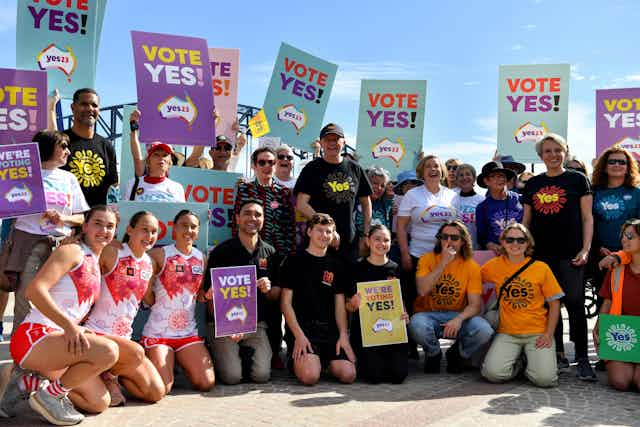Prime Minister Anthony Albanese today announced that the referendum on an Indigenous Voice to parliament will be held on October 14. To succeed, a constitutional referendum requires a majority in at least four of the six states as well as a national majority.
I have been tracking 2023 Voice polls in a graph since early July. This graph now shows the referendum date.

A Voice poll hasn’t been conducted since the mid-August Resolve poll that gave “no” a 54–46 lead. But all recent polls have trended to “no”, with the most friendly pollster for “yes” (Essential) showing “no” ahead by 47–43 in their early August poll.
In early May I wrote that just one out of 25 Labor-initiated referendums had succeeded in winning the required double majority. Furthermore, while not succeeding, referendums held by Labor had performed much better when held with a general election than as a standalone vote.
Read more: While the Voice has a large poll lead now, history of past referendums indicates it may struggle
With the polling trends as they are, it’s very difficult to see “yes” winning a national majority. If “no” wins nationally, the state results don’t matter.
Ticks and crosses referendum issue
The Australian Electoral Commission will instruct voters to write either “yes” or “no” in the space provided on the ballot paper. But in a media release last Friday, the AEC said that, owing to longstanding legal advice, ticks would be counted as “yes” votes, but crosses would be informal.
This legal advice says a tick is used to indicate approval, so it should be counted as “yes”. A cross can indicated disapproval, but can also indicate a choice, such as on government forms. As a cross is ambiguous, it should not be counted.
Analyst Kevin Bonham said the informal rate at the two 1999 referendums was about 0.9%, and these informal votes would have included blank and other clearly informal votes, so the cross informal rate was likely about 0.1%.
The “no” side is now well ahead in polling for this referendum, and that lead is increasing. It’s very unlikely the ticks and crosses issue will affect the result.
Essential poll: 51–43 to Labor including undecided
In last week’s federal Essential poll, conducted August 16–20 from a sample of 1,151, Labor led by 51–43 including undecided (52–42 the previous fortnight). Primary votes were 33% Labor (steady), 33% Coalition (up three), 14% Greens (up two), 5% One Nation (down three), 3% UAP (up one), 7% for all Others (down one) and 6% undecided (steady).
Respondents were asked to rate Albanese, Peter Dutton and Greens leader Adam Bandt from 0 to 10. Ratings of 0–3 were counted as negative, 4–6 as neutral and 7–10 as positive. Albanese was at 37–29 positive (36–27 in June). Dutton was at 35–27 negative (34–27 previously). Bandt was at 36–21 negative (38–21 previously).
In a forced choice, 57% said they were glad Albanese’s Labor government won the last election, while 43% said it would have been better if Scott Morrison’s Liberal government had been re-elected.
By 67–13, voters agreed that professional sportswomen and sportsmen should be paid equally, and by 50–21 they agreed their interest in women’s sport had increased after Australia hosted the women’s soccer world cup.
On regulation of rents, 34% wanted rents frozen until economic conditions improve, 44% allowed to rise once a year by no more than inflation, 11% allowed to rise once a year by any amount and 10% unlimited rent increases.
By 90–10, voters thought they should have a right to know whether content is generated by Artificial Intelligence or not. On benefits and risks, 54% thought AI development has an equal amount of benefits and risks, 36% more risks than benfits and 10% more benefits than risks.
By 52–48, voters said they were financially comfortable over struggling, the first lead for comfortable in this question since late March.
Morgan poll: 53.5–46.5 to Labor
In this week’s federal weekly Morgan poll, conducted August 21–27 from a sample of 1,396, Labor led by 53.5–46.5, a 0.5-point gain for Labor since the previous week. Primary votes were 35% Labor (up 1.5), 35% Coalition (down 1.5), 13.5% Greens (up one), 5% One Nation (down one), 6.5% independents (down two) and 5% others (up two). Labor dropped 1.5 points last week.
NSW: Mark Latham resigns from One Nation
On August 22, New South Wales upper house MPs Mark Latham and Rod Roberts resigned from One Nation, after accusing the party of “defrauding NSW electoral funds”. They will continue to sit as independents in the NSW upper house. Latham had earlier been ousted by Pauline Hanson as One Nation’s NSW leader.
These defections reduce One Nation from three to one NSW upper house MP. Two of their three MPs were elected in 2019, and will be up for election in 2027. Latham was elected in 2023, so his term doesn’t finish until 2031.
Victorian Warrandyte byelection: Liberals crush Greens
At the 2022 Victorian state election, the Liberals beat Labor in Warrandyte by a 54.2–45.8 margin. Labor did not contest Saturday’s byelection. The Liberals defeated the Greens by 71.1–28.9, from primary votes of 57.4% Liberals (up 8.9%), 18.6% Greens (up 7.4%), 5.7% Labour DLP (new), 4.1% independent Maya Tesa (new) and 3.9% Victorian Socialists (new). Labor won 33.2% in 2022.
It’s difficult to interpret byelections that are forfeited by one major party, but the Liberals will be happy with the surge in their primary vote. Many Labor voters clearly voted Liberal instead of Greens.
Right likely to win October 14 New Zealand election
I wrote for The Poll Bludger on August 23 that the two main right-wing New Zealand parties are likely to form government after the October 14 New Zealand election, replacing the current Labour government. The right is also likely to win the October 22 Argentine election, while there’s a UK byelection in an SNP-held seat to come.

